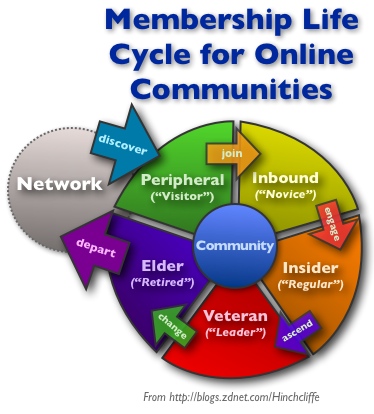Ten leading platforms for creating online communities

Creating online communities of customers and workers has been one of the hotter topics in business and technology this year. Whether you're on the business side, in IT, or are just trying to build virtual teams around shared goals, online communities are rapidly becoming a popular way to organize people and accomplish work in a highly collaborative manner.
Learning how to design an effective community is something we’re all going have to get better at in coming years.It's beginning to be understood that communities aren't just for socializing but for getting things done.
The open source world has been using vast collaborative online communities to develop complex software products successfully for nigh unto a decade. That communities produce robust results is hardly news to them. So too with other early examples of community like some newsgroups and wikis, particularly Wikipedia. The rise of social networking and fundamentally user-powered Web 2.0 applications as a common daily activity has further helped move online communities into a mainstream business topic this year. Social media -- and blogs in particular -- are also helping raise awareness of the power and reach of community-based communication and collaboration.
Like many technology advances, network-based communities are taking a while to trickle down to the business trenches in a meaningful way, but it is now clearly getting there.
I covered some compelling examples of online customer communities in my recent best practices post and by all accounts, too many online communities today exhibit worst practices such as lack of sustained community management, a tendency to use communities for "push marketing", cross wiring business and consumer motivations, and lastly, starting with the technology first. Part of this is that we're in the early days yet and online communities are a new discipline for most of us, having only recently begun a large-scale move form the edge of the network and more into the center of our daily work.
That most of us are not fluent community facilitators is something that will almost certainly be addressed as a vital new workplace ability and one that we will have to acquire diligently to work effectively in the future. Those that can reach out, engage, and elicit useful participation over the network will increasingly have the advantage when it comes to achieving directed, collaborative problem solving, often known as tacit interactions.
Note that this also informs the Enterprise 2.0 story since community is a particularly important issue when we talk about the success of social software in the workplace. This is because community forms the foundation and virtual tent within which network-based collaboration occurs.
Learning how to design an effective community, whether it's on-the-fly for a small, ad hoc team effort on an upcoming project or a large-scale, long-term customer community of millions of users, is something we're all going have to get better at in coming years. A good place to start to see the type of subject matter we have to master is the online community entry on Wikipedia. This means delving into academic subjects such community membership lifecycles (show in diagram above), Kollock's Framework, the diffusion model of user adoption, and other esoterica.
One can also just dive into a community and learn the ropes with direct experience. However, as is typical with so many aspects of software and process, there are points of leverage that -- if isolated and optimized for -- can produce the best results for the least effort. Consequently, the best source of knowledge is likely some hands-on experience combined with some distilled formal knowledge, after which only then is one ready to tackle the technology side of community.
Community platforms: Technology enablers of social computing
So, once you've done your homework and you have a good sense of how communities work, have established clear goals, assigned capable talent as well as made a commitment of time and energy, and began to understand what your community is about and what it would like ot do, you're now just getting ready to get a sense of the technology landscape. I've made a point to put this community knowledge pre-amble in front the platforms list since we have learned from recent case studies that technology decisions should come towards the end of a community. Otherwise the vagaries of the platform itself tends to shape the community effort too the extent that the community design is beholden to technology decisions made too early.
Which platform a community effort should use is much better driven by the high-level goals and a co-developed design, with the technology subsequently selected to support them. However, it's also naive to think that most organizations don't already have a preference for a certain technology stack or even a specific community platform, which they may have already acquired or used previously. In general, however, we are learning from this year's studies that when technology drives the community, the outcome tends to suffer. Lastly, shaping the community design too much in a vacuum is also a common antipattern. As always with modern development processes, involve users as early as possible and often.
In preparing this list, I encountered literally hundreds of content management (CMS) and portal products across a great swath of maturity and capability levels. Along the way, it became very clear that extending the CMS and portal worlds into the community product space is a natural evolution that many vendors and open source projects have made, if not often achieved with great effect or distinction. However, a few products stood out head and shoulders from the rest, old players and new alike, with a couple of surprises. I also attempted, to the extent possible, to remove bias with an objective scoring system based on a number of external criteria. That being said, this is my own list, and I'm certain others will have a different list. To those, I ask that you please add your own picks in TalkBack below.
The list below is in rough order of general industry popularity.
Ten leading platforms for online communities
It was interesting to see how the technologies and platforms shaped up in terms of open source and commercial software as well as software packages vs SaaS. We're seeing a healthy mixture of options available for just about any requirements, though the open source options tend to be richer because of their extensible nature and the large number of contributors building plug-ins and add-ons.
A number of interesting offerings didn't make this top 10 cut and so I thought it would also be worthwhile to include the next 15 candidates since we are likely to see them more often in the near future. They made the list due to overall popularity, innovative features, early groundswell, or a combination thereof:
11. Mambo - Popular, old school PHP community-platform.
12. Lotus SameTime and Lotus Connections - IBM's answers to community with many integrated capabilities.
13. OneSite - White label, on-demand social network and community.
14. BoonEx - SaaS community that is extensively widget-based with many features and capabilities.
15. Crowdvine - Used to power the community for the popular Web 2.0 Expo conferences, Crowdvine has full community, content management, and external site integration.
16. Facebook Open Platform - Use the Facebook platform for your community with the open source version of the platform.
17. Mzinga - A solution designed for industry verticals such as HR and marketing, Mzinga is seeing strong uptake.
19. HiveLive
20. SocialGo - On-demand SaaS community service.
21. IglooSoftware - A relatively new entry, Igloo is focusing on the enterprise user with ease-of-use and simplicity as a top feature.
22. GroupSwim
23. SocialCast
24. Tomoye
25. Pinax - Brand new and feature rich. Pinax is getting considerable early adopter interest. Based on Python, Pinax is open source.
As always, please add your own in TalkBack below.
Coming up soon: Community management: What it is and why it matters so much. Also, a long-overdue examination of the uptake this summer of the term Web Oriented-Architecture.
What's you're favorite community platform and why?
Update: A reader pointed out that Lotus Connections is part of IBM's community solution so the list is revised above.
